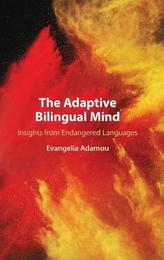
|
The Adaptive Bilingual Mind: Insights from Endangered Languages
Hardback
Main Details
| Title |
The Adaptive Bilingual Mind: Insights from Endangered Languages
|
| Authors and Contributors |
By (author) Evangelia Adamou
|
| Physical Properties |
| Format:Hardback | | Pages:250 | | Dimensions(mm): Height 160,Width 235 |
|
| Category/Genre | Language - history and general works
linguistics
Psycholinguistics |
|---|
| ISBN/Barcode |
9781108839518
|
| Classifications | Dewey:306.44 |
|---|
| Audience | | Professional & Vocational | | Postgraduate, Research & Scholarly | |
|---|
| Illustrations |
Worked examples or Exercises
|
|
Publishing Details |
| Publisher |
Cambridge University Press
|
| Imprint |
Cambridge University Press
|
| Publication Date |
15 April 2021 |
| Publication Country |
United Kingdom
|
Description
At present, much of the research on bilingual cognition focuses on late second language learners of a small number of languages. In this fascinating book, Evangelia Adamou widens the net by integrating advances in the field of bilingualism with the study of endangered languages. Drawing on recent studies from Europe and Latin America, she demonstrates that experimental psycholinguistic methods can be successfully applied outside the lab and, conversely, how data from these understudied populations provide new insights into the adaptive capacities of the bilingual mind. Adamou shows how bilinguals manage competing conceptualizations of time and space, how their grammars and language mixing patterns adapt to cognitive constraints such as the need for simplification, and how language processing concurrently adapts to their complex bilingual experience. Combining statistical analyses with detailed linguistic and ethnographic information, this essential book will appeal to scholars of bilingualism, cognitive sciences, language endangerment, and language contact.
Author Biography
Evangelia Adamou is Senior Researcher at the Centre National de la Recherche Scientifique (CNRS), Paris, France.
Reviews'... Adamou's book is a timely and welcome monograph that should be viewed as an encouragement to conduct experimental studies when applicable and necessary with endangered language speakers (including HL-speakers) to complement offline research efforts.' Michael T. Putnam, Heritage Language Journal
|